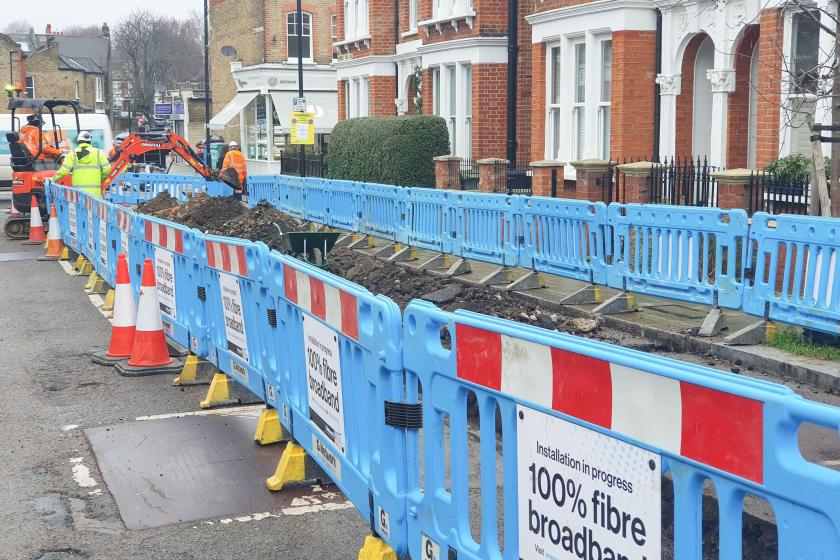Permitting: The Next Big Enterprise Broadband ChallengePermitting: The Next Big Enterprise Broadband Challenge
It is ISPs vs. local government with providers waiting for broadband permit approvals that can add costs and delays for enterprise network expansion.
July 21, 2023

The Broadband Equity and Access Deployment (BEAD) funding has been announced for all states. But the actual delivery of high-speed Internet access to all under the historic spending effort is facing a huge challenge in permitting that could slow rollouts to a crawl.
That is why telecom leaders are pressing Congress harder than ever to pass legislation that would remove regulatory hurdles at the local level and both streamline and lower the expense of broadband deployment.
A permitting bill arises but has fans and foes
The House Energy and Commerce Committee has passed a bill, the American Broadband Deployment Act of 2023, led by Republican representatives, which would put a 60-day time limit on local review procedures for broadband undertakings. It also says permitting applications would be approved after that deadline if the project has not been denied by the city or town.
Mayors from across the nation oppose the bill claiming it preempts their authority over the deployment of telecommunication infrastructure on local public property.
And although there’s opposition, a tsunami of permit requests for the nation’s largest ever broadband deployment ($42.5 billion in BEAD funding) will still hit those that review and process requests. Are the reviewers and processors properly staffed and prepared to ride the wave, or will it wash them away?
In related news, many parties are still waiting for a ruling from the Federal Communications Commission (FCC) on pole attachments which presents a pressing problem for the deployment of aerial fiber. It is an issue pitting ISPs against pole owners.
A patchwork of current permitting rules
After almost two years on the issue, those in the know are beginning to wonder if Congress equals progress, concerned that a patchwork of current rules for permitting will delay the time when the rubber of carrier contractors and construction crews finally hits the road to begin the BEAD project rollout.
In an expert opinion piece published in late June, Clearfield CEO and Minnesota Hall of Fame member Cheri Beranek summed up the permitting challenge.
“Permits serve a purpose, but unchecked, they will become a barrier to closing the digital divide,” Beranek wrote. “Many of these permitting processes have gone unchecked for decades, but it has never been more urgent to unravel these complex permitting webs we have woven. We have gotten a record-setting federal investment to ensure everyone can access high-speed broadband. We should do everything in our power not to waste it.” Her company is advancing fiber deployment solutions to meet evolving needs.
Others with skin in the game are not saying whether they are for or against the HR bill, perhaps waiting for something better. That includes the Fiber Broadband Association (FBA), an industry trade group representing those interested in fiber first and foremost for providing broadband internet for all with BEAD. A representative for the FBA declined to comment on the bill.
Permitting process challenges are not a new problem, but a career opportunity
The BEAD-funded broadband rollout, like many service deployments including wireless, fiber to the home (FTTH), 5G, and even device-based IoT offerings, face state and local permitting rules for trenching for fiber, attaching fiber to telephone poles, and building antennas for microwave towers. Localities continue to hope they can manage disruption to everyday operations of their cities and towns by taking time to review permit requests and associated expenses.
Perhaps no infrastructure provider knows that better than Crown Castle, which rents space on its 40,000 cell towers across the nation to service providers to help launch services such as 5G. Its network includes fiber optics, and the nearly 30-year-old corporation continues to be a destination for network operations staff, fiber splicers, and of course, permit process specialists.
In a featured posting, Crown Castle described the duties of the Permitting Specialist. Job duties include "the preparation and submittal of various entitlement applications, permits, and agreements to allow installation of communications facilities on Crown Castle poles, towers, fiber, and other infrastructure." The position requires knowledge of municipal processes, codes, and ordinances, as well as frequent interface with local governments and jurisdictions.
How we can fix the permitting process
Given the unprecedented amount of BEAD money allocated to finally deliver broadband internet to un- and underserved areas, it is time to bring sides together today to find a permitting process that can handle an anticipated sustained spike in the volume of requests for access.
A collaborative effort that includes localities and ISPs would go a long way toward that goal. Add in other common stakeholders, such as state and federal government agencies that are frequently part of the process, and overcoming a formidable challenge to broadband can be overcome.
Related articles:
About the Author
You May Also Like




